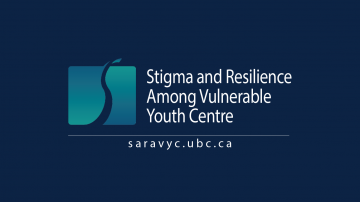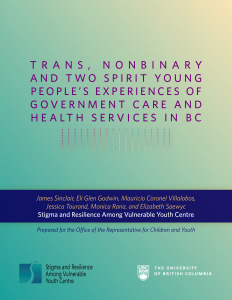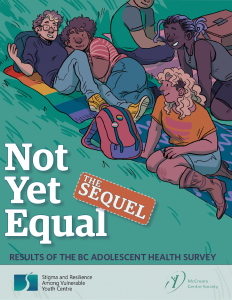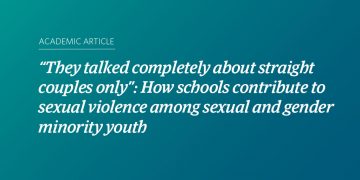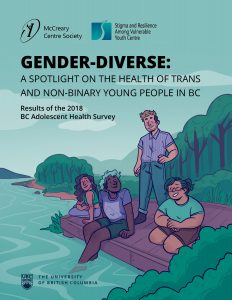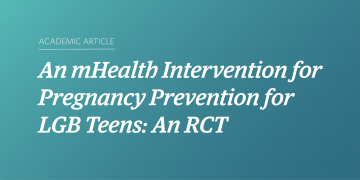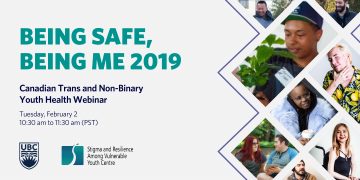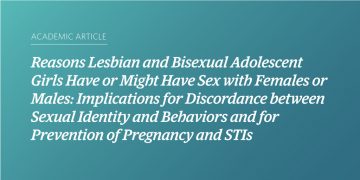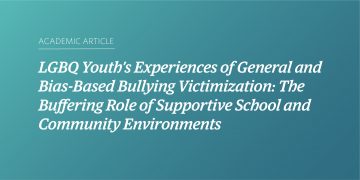2SLGBTQ+ inclusive education initiatives are essential to fostering safe school environments for all youth–not just 2SLGBTQ+ youth
As the current researchers evaluating SOGI 1 2 3, the Stigma and Resilience Among Vulnerable Youth Centre (SARAVYC) would like to express our support for educational programs that make schools safer for 2SLGBTQ+ children. These programs are vital for the well-being and safety of all children and, to quote the BC Human Rights Commissioner Kasari Govender, “the human rights of LGBTQ2SAI+ people are not up for debate.”
Report Launch: Representative for Children and Youth release The Right to Thrive: An Urgent Call to Recognize, Respect and Nurture Two Spirit, Trans, Non-Binary and other Gender Diverse Children and Youth
In Representative Charlesworth’s own words, “Let’s be clear: young people have the right to be who they are and to thrive…The hate speech and anti-trans legislative efforts we have seen recently in Canada and the United States is alarming and is causing great harm.
The Right to Thrive: An Urgent Call to Recognize, Respect and Nurture Two Spirit, Trans, Non-Binary and other Gender Diverse Children and Youth from the Representative for Children and Youth
In Representative Charlesworth’s own words, “Let’s be clear: young people have the right to be who they are and to thrive…The hate speech and anti-trans legislative efforts we have seen recently in Canada and the United States is alarming and is causing great harm.
Not Yet Equal (the Sequel): Results of the BC Adolescent Health Survey
Not Yet Equal (the Sequel): Results of the BC Adolescent Health Survey provides a profile of the health LGBTQ youth in British Columbia (BC). The report is a collaboration between researchers at SARAVYC and the McCreary Centre Society and uses data from the 2018 BC Adolescent Health Survey (BC AHS), which is one of the […]
“They talked completely about straight couples only”: How schools contribute to sexual violence among sexual and gender minority youth
This study examined contextual factors shaping sexual violence victimisation and perpetration among sexual and gender minority youth, with school playing a key role. Based on qualitative data from semi-structured interviews with 50 young people aged 14–26 years who self-reported sexual violence perpetration in the Growing Up with Media survey, the analysis demonstrates how schooling’s ‘hidden curriculum’ leaves sexual and gender minority youth ill-equipped to navigate the world of sexuality.
An mHealth Intervention for Pregnancy Prevention for LGB Teens: An RCT
Although lesbian, gay, bisexual and other sexual minority (LGB+) girls are more likely than heterosexual girls to be pregnant during adolescence, relevant pregnancy prevention programming is lacking. Girl2Girl appears to be associated with increases in pregnancy preventive behaviors for LGB+ girls, at least in the short-term. Comprehensive text messaging–based interventions could be used more widely to promote adolescent sexual health behaviors across the United States.
Join us for a webinar and Q&A about the links of provincial policy, IDs, and gender affirming care to trans and non-binary youth health
How is access to gender-congruent ID related to mental health outcomes? Does having a primary care provider increase access to gender affirming care and does this access change depending on the level of comfort towards the primary care provide? What is the link between Canadian provincial health services policy and access to gender affirming care? Join us for a webinar on February 2nd where we discuss the research behind these questions.
Reasons Lesbian and Bisexual Adolescent Girls Have or Might Have Sex with Females or Males: Implications for Discordance between Sexual Identity and Behaviors and for Prevention of Pregnancy and STIs
We examined reasons lesbian and bisexual adolescent girls have sex or, if sexually inexperienced, might have sex with girls or boys, and the role of internalized homonegativity in these relations and among lesbians.
